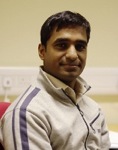St. Andrews University
Organic Semiconductor Centre (OSC)
The Organic Semiconductor Centre (OSC) is based at the University of St Andrews in the east of Scotland. The OSC brings together physicists and chemists at the University of St Andrews to undertake collaborative research on remarkable plastic-like materials that can conduct electricity and emit light. Organic materials are an important new class of semiconductors as they combine the virtues of plastics, which can be easily shaped, with those of semiconductors which are the basis of all microelectronics. These novel materials can be used to make lightweight flexible optoelectronic devices such as displays, solar cells and lasers. Established in 2001, the OSC is an interdisciplinary research centre with world class facilities and expertise in the study of organic semiconductor and hybrid materials and devices.
Research
The OSC conducts scientific research in a wide selection of areas. Our research includes:
• Photophysics
• Organic Lasers
• Organic Light Emitting Diodes
• Light-Emitting Dendrimers
• Organic Solar Cells
• Biophotonics
• Organic Electronics
Much more detailed information on each of these areas is available on our OSC website.
To enable research into such a wide variety of systems we have a large amount of equipment we use to enable device fabrication, characterisation and testing; materials characterisation, through both chemical and photophysical techniques; and also a femtosecond laser facility to understand materials processes on the ultrafast timescale.
People
People from the OSC involved in LAMP:
Ifor Samuel
 Ifor studied for both his MA and PhD in Physics at Cambridge where he developed his fascination with conjugated polymers. After finishing his PhD he moved to Paris and worked with France Telecom for two years, investigating the non linear optical properties of organic materials. Then he returned to Cambridge for a year, received a Royal Society University Research Fellowship and took up a position at the University of Durham until August 2000 when he moved to St Andrews. In 2001 he started the Organic Semiconductor Centre to encourage collaboration between physicists and chemists in developing the next generation of organic semiconductors and the wider field of organic electronics.
Ifor studied for both his MA and PhD in Physics at Cambridge where he developed his fascination with conjugated polymers. After finishing his PhD he moved to Paris and worked with France Telecom for two years, investigating the non linear optical properties of organic materials. Then he returned to Cambridge for a year, received a Royal Society University Research Fellowship and took up a position at the University of Durham until August 2000 when he moved to St Andrews. In 2001 he started the Organic Semiconductor Centre to encourage collaboration between physicists and chemists in developing the next generation of organic semiconductors and the wider field of organic electronics.
Gordon Hedley
 Gordon was born and brought up in Stranraer in south west Scotland. In 2005 he received an MSci degree in Physics from the University of Durham. His Masters year project at Durham was investigating the dynamics of new OLED compounds and it was here that he first became enthused by the field of chemical physics. He joined the Organic Semiconductor Optoelctronics group here in St Andrews in September 2006 under the supervision of Prof. Ifor Samuel to commence study for a PhD on the ultrafast photophysics of iridium complexes. Gordon is currently a research fellow, looking at the photophysical properties of organic systems.
Gordon was born and brought up in Stranraer in south west Scotland. In 2005 he received an MSci degree in Physics from the University of Durham. His Masters year project at Durham was investigating the dynamics of new OLED compounds and it was here that he first became enthused by the field of chemical physics. He joined the Organic Semiconductor Optoelctronics group here in St Andrews in September 2006 under the supervision of Prof. Ifor Samuel to commence study for a PhD on the ultrafast photophysics of iridium complexes. Gordon is currently a research fellow, looking at the photophysical properties of organic systems.
Ashu Bansal
Ashu was born in Saharanpur in India. He received M.Sc in physics from Indian Institute of Technology (IIT) Roorkee and M.Tech. in applied optics from Indian Institute of Technology (IIT) New Delhi. After this for a brief period he has worked on Fibre Bragg Grating (FBG) sensors as a project assistant in central scientific instruments organisation, Chandigarh. Then he moved to Germany to obtain his Ph.D. in physics at University of Regensburg under the supervision of Prof. Alfons Penzkofer on spectroscopic characterisation of organic electroluminescent materials. In June 2008 Ashu has joined the Organic Semiconductor Optoelectronics group as a research fellow and since then he has been involved in various projects, which include photophysical characterisation of materials to device fabrication. Currently he is interested in organic
bioelectronics, OLEDs, organic photovoltaics, wearable sensors and in paper microfluidics.
Where we are
We are based in the School of Physics and Astronomy at the University of St Andrews in Scotland. Located 80 km north-east of Edinburgh, the small town of St Andrews is famed for two things, its university and its status as the home of golf.
To get to St Andrews the university has provided a comprehensive guide of travel options.
Contact info
We can be reached by any of the following means
- By mail:
Prof. Samuel/Dr Hedley
School of Physics & Astronomy
University of St Andrews
North Haugh
St Andrews
KY16 9SS
Scotland, U.K.
- Tel: +44 1334 463114
- Fax: +44 1334 463104
- Email: polyopto@st-andrews.ac.uk
- OSC Website: http://www.st-andrews.ac.uk/~osc/



